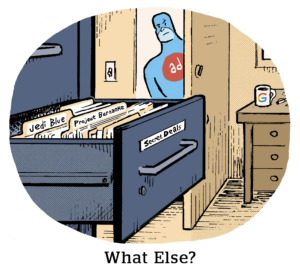Here’s today’s AdExchanger.com news round-up… Want it by email? Sign up here.
Roku On A Roll
Roku announced a beta program for dynamic linear ad insertion (DLA).
Dynamic ad insertion (DAI) was one piece of Roku’s acquisition of Nielsen’s advanced video advertising business last year.
Roku’s pitch for DLA is to increase linear addressability by targeting ads to live TV pods, so people watching the same linear channel may see different ads while watching the same programming. The goal is to marry “the best of TV with the best of digital,” Roku VP of product management Louqman Parampath tells Adweek.
The DLA pilot launch follows a quieter announcement on Monday, when Roku renewed a streaming distribution partnership with Amazon to keep Prime Video and IMDb TV apps on Roku devices. The agreement contrasts with the recent and contentious dispute between Roku and Google regarding YouTube and YouTube TV.
With a one-sentence confirmation of a “multi-year extension” of the deal, it’s not clear what terms Amazon (or Roku) will be beholden to. Roku previously pushed back on Google for what it said were anticompetitive demands – Roku had no sales rights in YouTube apps on Roku devices, a deal enjoyed by no other CTV app. Though perhaps YouTube still has that agreement, since we don’t know terms of the Roku-Google deal either.
Get The Net
Early this week, Ben Thompson of Stratechery made the case for Netflix to launch an ad business. It seems a no-brainer: easy revenue and a way to corral viewers who can’t afford the subscription.
The typical current US Netflix subscriber would be ad-free, anyways. There just would be an additional discount tier.
But there are compelling reasons not to, Thompson acknowledges in a follow-up – Why Netflix Should Not Sell Ads.
For one, not every response is rational. People like Netflix and pay a premium for it, partly because it’s ad-free. With an ad-supported tier, the dynamic flips – You’re not paying for premium content but to avoid ads.
Most people who say Netflix needs advertising actually need Netflix to get into advertising themselves, because it’s an unreachable audience.
What Netflix needs is revenue growth beyond subscriptions. There aren’t many prospects left because people already chose to subscribe or not.
But Netflix can borrow another TV tactic: syndication. NBCUniversal distributes shows on Disney’s Hulu. Why not a Netflix Original?
Netflix’s current bet is gaming. Games reinforce the ad-free commitment, too. A week ago, Netflix bought a game studio – its third since September – and the developers cited the ad-free model as a chance to focus on gameplay, not marketer priorities.
Not So Farfetched Now?
As retailers launch ecommerce media businesses, they tend to settle on one or a few partners with exclusive access. It’s a different approach than with big digital media publishers, which integrate many SSPs and vendors but rarely provide exclusive benefits.
Walmart built its setup with The Trade Desk. Kroger opened its online platform to third-party ad tech last week, starting with three ecommerce agencies: Pacvue, Skai and Flywheel Digital. Macy’s launched a media business a year ago and told investors last month it uses the ecommerce marketing company Mirakl.
Those flagship contracts are valuable but perilous. They’re actually less lucrative, because the retailer knows the validation it brings and expects service almost at cost. And the exclusive deals can and will be pulled in-house at some point.
Farfetch, the ecommerce marketplace and tech company, reduced the risk in one major partnership by leading a $200 million investment in Neiman Marcus, which also owns Bergdorf Goodman. The Neiman brands will become exclusive clients of Farfetch Platform Solutions, as its offering is called.
“This is a significant digital transformation opportunity that will allow us to unlock massive value for Neiman Marcus Group,” says Kelly Kowal, Farfetch chief platform officer, in a release.
But Wait, There’s More!
Canada is the latest government to introduce a law that would force online platforms to share revenues with news publishers. [NYT]
Agencies are hiking prices and blaming inflation. [Digiday]
Microsoft makes more moves in search advertising. [Search Engine Land]
Discovery and WarnerMedia’s merger could close as soon as this Friday. [Variety]
You’re Hired!
NBCUniversal poaches Netflix and Hulu vets Shannon Willett and Brian Henderson for Peacock’s executive team. [Variety]
EX.CO names Maya Szutan-Azoulay as chief operating officer. [release]
Oceanwing, an ecommerce agency owned by Anker, hires Steven Fish as head of growth. [release]














